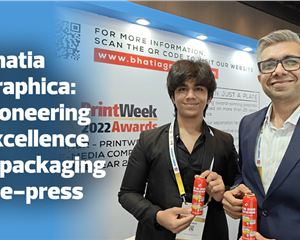Industry insiders react to Union Budget 2019
Finance Minister Nirmala Sitharaman, in her first presentation of the Union Budget on 5 July 2019, imposed 10% import duty on newsprint and 5% import duty on printed books. The rationale behind the 5% custom duty on imported books was “to encourage domestic publishing and printing industry”. Meanwhile imported newsprint, uncoated paper used for printing of newspapers and lightweight coated paper used for magazines will attract 10% custom duty.
08 Jul 2019 | By PrintWeek India
The industry had a mixed to positive reaction to the budget.
Sanjiv Puri, chairman and managing director, ITC, said, “I must compliment the Finance Minister for presenting a Budget that provides a comprehensive roadmap to foster growth with social equity and climate resilience. The Budget proposal indeed gives a strong directional impetus to the agricultural sector by promoting ‘agri-preneurs’ and value addition in agri-produce whilst addressing the critical need for water security. The move to enable sustainable agriculture through zero budget farming and promotion of agri-based renewable energy is indeed laudable. It is heartening to note the thrust provided to infrastructure development, the MSME sector and job creation.”
Sandip Somany, president, FICCI, said, “Directionally, the budget is good, and it takes forward the plan that was laid out by the government during the Interim budget. There are several positives in the budget, and it provides a set of benefits for most segments of the society. We see a clear action plan for realising the vision of making India a USD five-trillion economy over the next few years with a focus on ease of living. The budget maintained its focus on infrastructure development. While the government would continue with its existing major national programs like Bharatmala, Sagarmala, Rural roads, Udan and Inland waterways scheme, the vision of taking connectivity to the next level through 'One Nation One Grid' for electricity and a similar plan for gas grids, water grids, i-ways and regional airports is indeed ambitious and would be transformational in its impact. "
Sumeer Chandra, MD, HP India, said, "It’s great to see the focus on making India a USD five-trillion economy by 2025, through investments in infrastructure, digital economy and job creation. In the short term, the Rs 70,000-crore capital boost for PSU banks will help improve business confidence and overall liquidity situation. The government’s intent in driving job creation across sectors by re-skilling and up-skilling the youth is a strong positive. Initiatives to prepare 75,000 skilled entrepreneurs in agro-rural industries through 100 new incubators under ASPIRE scheme and training 10 million youth under the Kaushal Vikas Yojana with new-age skills in areas like artificial intelligence, internet of things, big data, 3D printing, virtual reality and robotics, will help create a large pool of skilled manpower in India.”
Monica Malhotra Kandhari, managing director, MBD Group, said, “The roadmap drawn by Finance Minister in the union budget augurs really well for the education sector. The vision statement of ‘Study in India’ to bring foreign students in India along with three-fold increase in allocation for world-class higher education — Rs 400 crore — is a move towards making India an education hub. Announcement of bringing new education policy, which proposes major changes in both school and higher education among others, is a commendable step towards a uniform and improved education system. Also, the government’s focus on imparting new-age skills in areas like artificial intelligence, internet of things, big data, 3D printing, virtual reality and robotics to equip youth will immensely help in creating a large pool of skilled manpower.”
DD Purkayastha, managing director & CEO, ABP, said, “The 10% customer duty on imported newsprint will affect very adversely. It will add a big financial burden to an already struggling newspaper industry.”
Dr Sandeep Pachpande, chairman, Audyogik Shikshan Mandal (ASM) Group, said, “We whole-heartedly welcome the ‘Study in India’ initiative by the government to attract foreign students. It’s been long due and I am sure this will impact positively to the economy. We are yet to receive the detail of the initiative and the plan for the initiative, but we will definitely do our best to support it. The proposed allocation of Rs 400-crore to higher education institutes will help cater many students across country. However, the requirement is much more and we were expecting a larger percentage of the budget will be allocated for it. Though in last four years, the government has under-spent the allocated budget for the sector, we are hoping the scenario will be different in FY20.”
Media and entertainment
In her budget proposal, the Finance Minister said the government proposed to start a television programme within the state-owned Door Darshan bouquet of channels exclusively for start-ups.
“This shall serve as a platform for promoting start-ups, discussing issues affecting their growth, matchmaking with venture capitalists and for funding and tax planning. This channel shall be designed and executed by start-ups themselves," she said in her budget speech.
Amod Khare, tax leader, Media & Entertainment, EY India, a leading consultancy, said, “Initiatives and incentives in the animation and AVGC space undertaken in certain states (like Maharashtra, Karnataka, Kerala) have made foreign investments in this space attractive in these states. Recognising the growth and employment potential of this space, the government has now proposed to examine measures that could be implemented to make India a preferred destination for foreign investment in animation and AVGC.”
Partho Dasgupta, CEO, BARC India, the broadcast audience research body, said, “Coming to the M&E industry, one will have to carefully look at the impact of allowing FDI in the media sector. We are happy as BARC India, for the impetus given to start-ups which will further propel efforts of the overall industry on innovation and digitisation.”
Ashish Bhasin, CEO, greater south and chairman and CEO, India Dentsu Aegis Network, said, “The government's decision to examine the opening up of FDI in media is beneficial for the sector. However, some of the actions of the government do seem contradictory and a letdown. The expectations from a government coming with such a majority were that they would undertake substantial reforms, stimulate growth and cut tax rates. However, they have missed the opportunity to do so and have acted contradictorily by implementing surcharge on HNI individuals. Despite everything I expect the next 10 years to be very bright for India.”
Deepak Lamba, CEO, Worldwide Media, said, “The opening up of FDI in the media and entertainment sector is a welcoming and promising initiative. This is a big step for content creators like us, for it now opens up a host of different avenues for the digital world. The Digital Entertainment Industry will certainly benefit from this."
Prashan Agarwal, CEO, Gaana, a music streaming service, said, “This Budget, we are particularly excited about the potential of Bharat Net in facilitating free access to digital-first services like governance, education, banking and entertainment across rural India.”
(Courtesy Campaign India and others)












 See All
See All